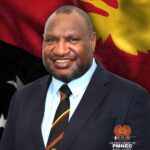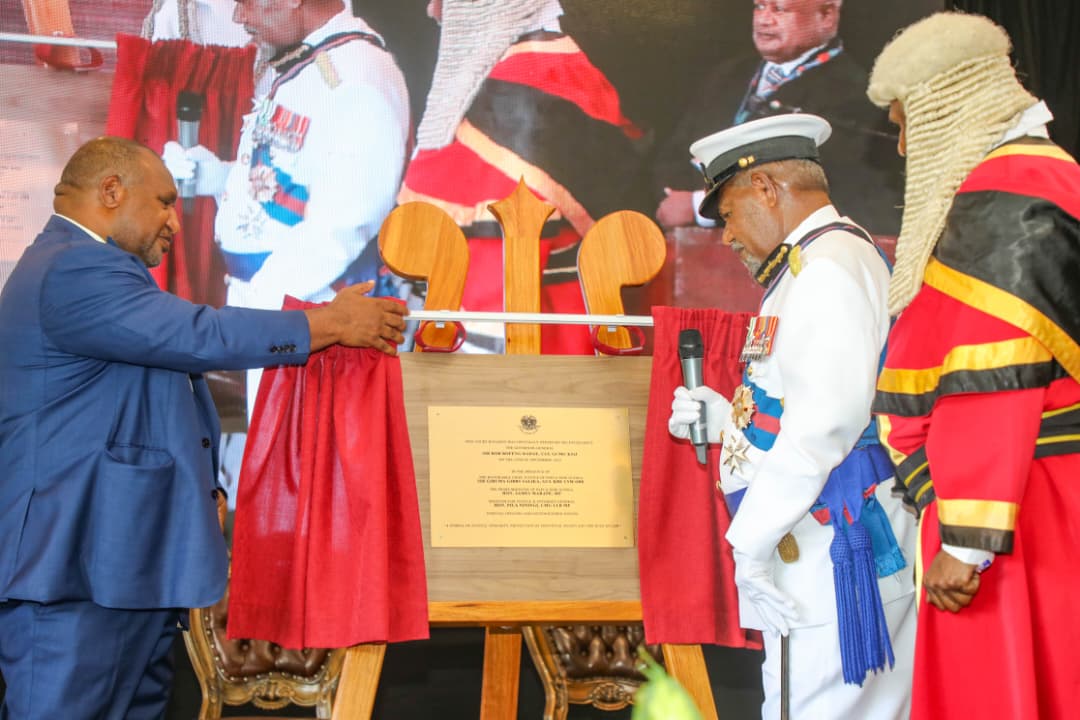On the Occasion of the Opening of the National and Supreme Court Complex
Salutation and Acknowledgement
• Master of Ceremony – Justice Panuel Mogish, CSM
• His Excellency the Governor General, Grand Chief Sir Bob Bofeng Dadae, GCl, GCMG, KStJ
• Hon. Chief Justice Sir Gibuma Gibbs Salika, GCl, KBE,CSM,OBE ~
• Hon. Parliamentary Speaker Job Pomat, CMG, MP
• Deputy Prime Minister – Hon John Rosso, MP
• Minister for Justice & Attorney-General, Hon. Pila Niningi, CMG, llB, MP
• Honourable Ministers,
• Members of Parliament
• The Chief Secretary,
• Members of the diplomatic corps,
• Judges of the Supreme Court, National Court, and Court of Appeal,
• Staff of the National Judicial Services,
• Representatives of China Railway Construction Engineering PNG Ltd,
• Representatives of Peddle Thorp Australia,
• Former and present public servants, engineers and tradespeople,
• Pastor Winnie Lonol,
• Fellow citizens of Papua New Guinea,
• Ladies and gentlemen.
Today, we gather at a truly historic moment in our nation’s journey. We are here to officially open this magnificent courthouse-a new home for our Supreme Court and our National Court. This is more than a building of concrete and glass. It is a monument to justice, a symbol of our democracy, and a commitment to the future of Papua New Guinea.
The Journey Since 1975
When Papua New Guinea became independent in 1975, our founding fathers gifted us a Constitution and a system of government that has withstood the test of time. At the heart of that Constitution was the judiciary, entrusted to interpret and protect the rule of law.
In those early years, the court system was modest. Cases were heard in smaller, improvised facilities, sometimes in borrowed buildings. Yet, despite the limited resources, justice was carried out, and the foundation of our democracy was strengthened.
As our population grew, as our economy expanded, and as disputes became more complex, the burden on our judiciary increased. For too long, our courts operated from facilities that were outdated and overcrowded. The vision for a modern national courthouse was conceived many years ago, nurtured by successive governments and generations of judges.
Today, after decades of perseverance, that vision has been realised.
Foundations in the Constitution
Our Constitution is clear in its design:
• Section 99(2) enshrines three co-equal arms of government – the Legislature, the Executive, and the Judiciary.
• Section 99(3) reinforces the principle of separation of powers, protecting the integrity of our democracy.
• Section 157 guarantees the independence of the Judiciary, shielding judicial decisions from outside influence.
Within this framework, the Judiciary stands as the guardian of justice – interpreting laws, upholding constitutional rights, and providing impartial recourse for every citizen.
Honouring Judicial Leaders
Let us honour those who have led our Judiciary since independence:
• Sir Sydney Frost (1975-1977) – guided PNG’s courts in their formative years.
• Sir William Prentice (1977-1980) remembered for landmark constitutional judgments.
• Sir Buri Kidu (1980-1993) – our first Papua New Guinean Chief Justice, who secured financial independence for the Judiciary.
• Sir Arnold Amet (1993-2003) – consolidated judicial reforms.
• Sir Mari Kapi (2003-2008) – distinguished for jurisprudence.
• Sir Salamo Injia (2008-2018) – who initiated this very project.
• Sir Gibbs Salika (2018-present) – embracing technology and reform, enhancing efficiency and international recognition.
Each of these leaders built upon the work of their predecessors, and together they have shaped the Judiciary into the institution we celebrate today.
An Investment in Justice
Our government has invested over K700 million to complete this modern complex. When my government came to office in 2019, we made it a priority to provide the financing needed to bring this project to completion.
But let me be clear: this is not simply an investment in a building. It is an investment in the very principle that holds our country together-justice.
A democracy cannot stand without strong and independent courts. Investors cannot place their confidence in our economy without a reliable justice system. Our people cannot enjoy peace in their communities without courts to settle disputes fairly.
This courthouse is a gift to mark our 50th anniversary of independence. It is a gift not only to the legal fraternity, but to every citizen who believes in fairness, equality, and the rule of law. And it will serve generations of Papua New Guineans to come.
One Law, One Nation
Papua New Guinea is the most diverse nation on earth. Over 800 languages, more than 1,000 tribes, and countless customs and traditions make up our social fabric.
Ours is not borrowed diversity-it is authentic diversity, rooted in thousands of years of history.
What then binds us together as one nation? It is not language or tribe. It is not wealth or status. It is the Constitution of Papua New Guinea.
It is the principle that one law, one rulebook, must apply equally to all of us.
The big or small, the educated or uneducated, the landowner or policymaker, the foreign investor or the local entrepreneur-every single one of us is equal before the law.This courthouse stands as a permanent reminder of that equality.
Democracy and the Rule of Law
As we reflect on 50 years of nationhood, let me reaffirm to all Papua New Guineans: there is no alternative form of government more suited to our country than democracy.
Other systems may appear enticing or efficient. But for a nation as diverse and complex as ours, democracy remains the only way to guarantee that every citizen has a voice, that every community has representation, and that every dispute is resolved under one law.
Our courts are the guardians of that democracy. They are the watchmen of our nation, the lighthouse that shines light into the dark corners where lawlessness may grow.
Without courts, there is no justice. Without justice, there is no democracy. And without democracy, there is no Papua New Guinea.
Restructuring for the Future
This courthouse also signals a new chapter of reform. On the recommendation of the Chief Justice, and with the support of Parliament, we have amended the Constitution to create a three-tier higher court system.
For the first time in our history, we now have a structured pathway from the National Court, to a newly created Court of Appeal, and then to the Supreme Court. This reform ensures efficiency, reduces backlogs, and strengthens confidence in the fairness of our judicial process.
Cases today are more complex than they were in 1975-ranging from billion-kina commercial disputes, to intricate land matters, to constitutional questions. Our judiciary must be equipped to handle these matters. That is why we are appointing more competent judges, and introducing arbitration and mediation to resolve disputes swiftly.
But our commitment does not end at the top. We are strengthening the entire law and justice sector-from the highest courts to village courts, from magistrates to land dispute committees, from police to correctional services. Justice must be accessible, efficient, and fair for every citizen.
Our Commitment as We Reset for the Next 50 Years
As Prime Minister, I give this pledge: law and order is the number one priority of my government as we enter the next 50 years of nationhood.
This majestic courthouse is part of that commitment, but it is not the end. In the years ahead, we will:
• Strengthen and resource the judiciary.
• Support and train magistrates, village court officials, police, and correctional services.
• Ensure that every Papua New Guinean-whether in the heart of Port Moresby or in the remotest village-has access to justice.
I call upon every citizen to do your part. Respect the law. Respect the courts. From the office worker in the city, to the farmer in the village, to the entrepreneur, to the public servant-living lawfully is the first and greatest contribution we can make to our country.
Acknowledgements
I acknowledge the Chief Justice and members of the judiciary for their dedication, persistence, and independence. I thank past governments for initiating this project. I especially honour all Chief Justices, past and present, whose leadership and vision have guided our judiciary for five decades.
And I am proud that since 2019, my government has provided the resources and leadership to deliver the completion of this courthouse.
This building is a collective achievement, but more importantly, it is a collective promise-a promise that Papua New Guinea will always remain a democracy governed by the rule of law.
Closing
As we open these doors today, let us renew our pledge: one people, one nation, one country-united under one Constitution, one judiciary, and one rule of law.
May these doors never close to any Papua New Guinean seeking justice. May this courthouse stand not only as a building of law, but as a symbol of who we are and what we aspire to be-a nation bound by fairness, equality, and democracy.
Thank you, and may God bless Papua New Guinea.






